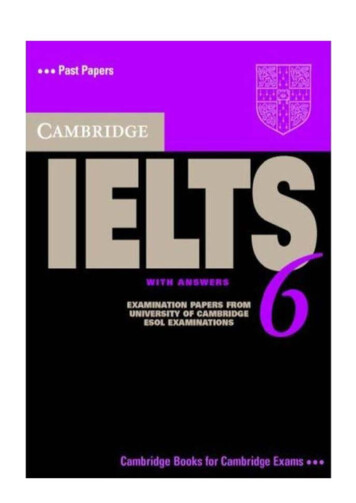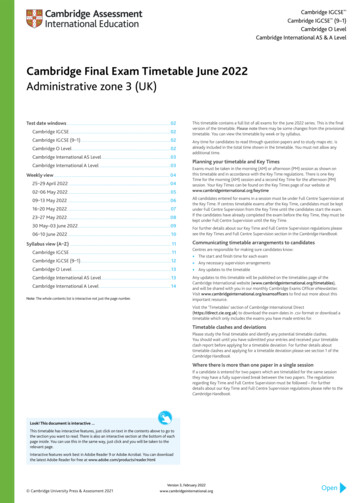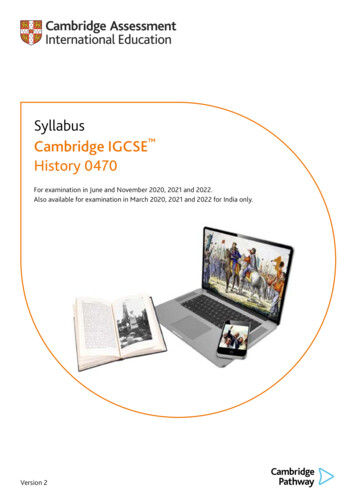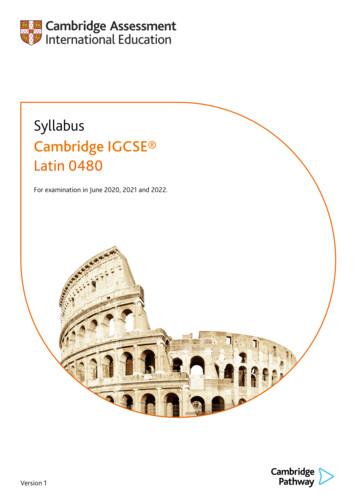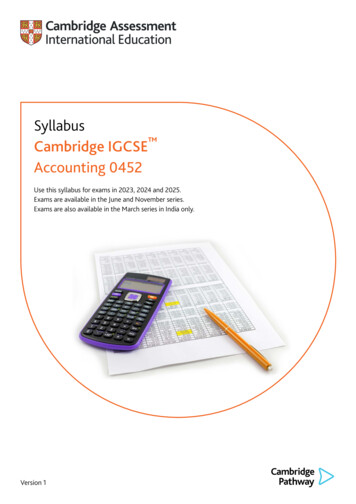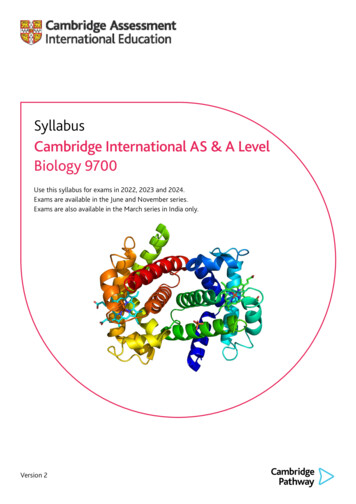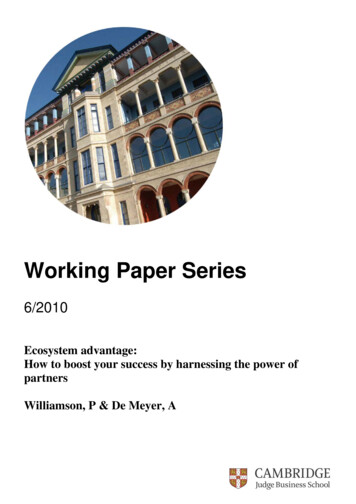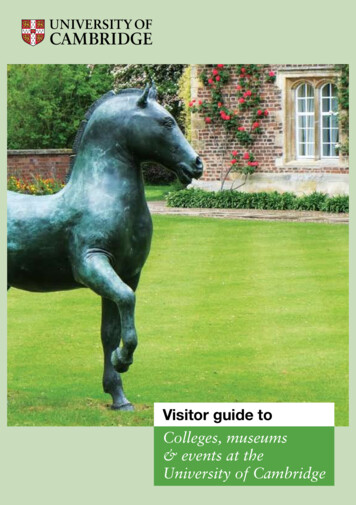
Transcription
SyllabusCambridge International AS & A LevelHistory 9489For examination in June and November 2021, 2022 and 2023.Also available for examination in March 2021, 2022 and 2023 for India only.Version 2
Why choose Cambridge International?Cambridge Assessment International Education prepares school students for life, helping them develop an informedcuriosity and a lasting passion for learning. We are part of the University of Cambridge.Our Cambridge Pathway gives students a clear path for educational success from age 5 to 19. Schools can shapethe curriculum around how they want students to learn – with a wide range of subjects and flexible ways to offerthem. It helps students discover new abilities and a wider world, and gives them the skills they need for life, so theycan achieve at school, university and work.Our programmes and qualifications set the global standard for international education. They are created by subjectexperts, rooted in academic rigour and reflect the latest educational research. They provide a strong platform forstudents to progress from one stage to the next, and are well supported by teaching and learning resources.We review all our syllabuses regularly, so they reflect the latest research evidence and professional teachingpractice – and take account of the different national contexts in which they are taught.We consult with teachers to help us design each syllabus around the needs of their learners. Consulting withleading universities has helped us make sure our syllabuses encourage students to master the key concepts in thesubject and develop the skills necessary for success in higher education.Our mission is to provide educational benefit through provision of international programmes and qualifications forschool education and to be the world leader in this field. Together with schools, we develop Cambridge learnerswho are confident, responsible, reflective, innovative and engaged – equipped for success in the modern world.Every year, nearly a million Cambridge students from 10 000 schools in 160 countries prepare for their future withthe Cambridge Pathway.‘We think the Cambridge curriculum is superb preparation for university.’Christoph Guttentag, Dean of Undergraduate Admissions, Duke University, USAQuality managementCambridge International is committed to providing exceptional quality. In line with this commitment, ourquality management system for the provision of international qualifications and education programmes forstudents aged 5 to 19 is independently certified as meeting the internationally recognised standard,ISO 9001:2015. Learn more at www.cambridgeinternational.org/ISO9001Copyright UCLES September 2018Cambridge Assessment International Education is part of the Cambridge Assessment Group. Cambridge Assessment is the brand name ofthe University of Cambridge Local Examinations Syndicate (UCLES), which itself is a department of the University of Cambridge.UCLES retains the copyright on all its publications. Registered centres are permitted to copy material from this booklet for their owninternal use. However, we cannot give permission to centres to photocopy any material that is acknowledged to a third party even forinternal use within a centre.
Contents1 Why choose this syllabus? .22 Syllabus overview . 6Aims6Content overview6Assessment overview8Assessment objectives93 Subject content . 10Paper 1 and 210Paper 324Paper 4274 Details of the assessment . 39Paper 1 Document question39Paper 2 Outline study39Paper 3 Interpretations question40Paper 4 Depth study41Command words415 What else you need to know .42Before you start42Group awards: Cambridge AICE43Making entries43After the exam45How students, teachers and higher education can use the grades46Grade descriptions46Changes to this syllabus for 2021, 2022 and 202347Changes to this syllabusFor information about changes to this syllabus for 2021, 2022 and 2023, go to page 47.The latest syllabus is version 2, published January 2019.
Cambridge International AS & A Level History 9489 syllabus for 2021, 2022 and 2023.1 Why choose this syllabus?Key benefitsThe best motivation for a student is a real passion for the subjectthey’re learning. By offering students a variety of CambridgeInternational AS & A Levels, you can give them the greatest chanceof finding the path of education they most want to follow. Withover 50 subjects to choose from, students can select the onesthey love and that they’re best at, which helps motivate themthroughout their studies.Following a Cambridge International AS & A Level programmehelps students develop abilities which universities value highly,including: a deep understanding of their subjects higher order thinking skills – analysis, critical thinking, problemsolving presenting ordered and coherent arguments independent learning and research.Cambridge International AS & A Level History is accepted by universities and employers as proof of knowledgeand understanding of History. Successful candidates learn to evaluate historical evidence, present clear and logicalarguments, assess different interpretations of an argument and develop an understanding of historical conceptssuch as cause and effect, similarity and difference and continuity and change.Our approach in Cambridge International AS & A Level History encourages learners to be:confident, developing the ability to analyse, explain and evaluate historical issues and argumentsresponsible, acquiring knowledge and skills through independent reading and enquiryreflective, reflecting on their growing understanding of how history works and making links with new areas ofstudyinnovative, improving their historical understanding through dealing with sources and interpretations of pastevents from different perspectivesengaged, developing their interest in history and broadening their knowledge and understanding of differentperspectives.‘Cambridge students develop a deep understanding of subjects and independent thinking skills.’Tony Hines, Principal, Rockledge High School, USA2www.cambridgeinternational.org/alevelBack to contents page
Cambridge International AS & A Level History 9489 syllabus for 2021, 2022 and 2023. Why choose this syllabus?Key conceptsKey concepts are essential ideas that help students develop a deep understanding of their subject and make linksbetween different aspects. Key concepts may open up new ways of thinking about, understanding or interpretingthe important things to be learned.Good teaching and learning will incorporate and reinforce a subject’s key concepts to help students gain: a greater depth as well as breadth of subject knowledge confidence, especially in applying knowledge and skills in new situations the vocabulary to discuss their subject conceptually and show how different aspects link together a level of mastery of their subject to help them enter higher education.The key concepts identified below, carefully introduced and developed, will help to underpin the course you willteach. You may identify additional key concepts which will also enrich teaching and learning.The key concepts for Cambridge International AS & A Level History are: Cause and consequenceThe events, circumstances, actions and beliefs that have a direct causal connection to consequential events anddevelopments, circumstances, actions or beliefs. Causes can be both human and non-human. Change and continuityThe patterns, processes and interplay of change and continuity within a given time frame. Similarity and differenceThe patterns of similarity and difference that exist between people, lived experiences, events and situations inthe past. SignificanceThe importance attached to an event, individual or entity in the past, whether at the time or subsequent to it.Historical significance is a constructed label that is dependent upon the perspective (context, values, interestsand concerns) of the person ascribing significance and is therefore changeable. InterpretationsHow the past has been subsequently reconstructed and presented by historians.Back to contents pagewww.cambridgeinternational.org/alevel3
Cambridge International AS & A Level History 9489 syllabus for 2021, 2022 and 2023. Why choose this syllabus?Recognition and progressionOur expertise in curriculum, teaching and learning, and assessment is the basis for the recognition of ourprogrammes and qualifications around the world. Every year thousands of students with Cambridge InternationalAS & A Levels gain places at leading universities worldwide. They are valued by top universities around the worldincluding those in the UK, US (including Ivy League universities), Europe, Australia, Canada and New Zealand.UK NARIC, the national agency in the UK for the recognition and comparison of international qualifications andskills, has carried out an independent benchmarking study of Cambridge International AS & A Level and found it tobe comparable to the standard of AS & A Level in the UK. This means students can be confident that their CambridgeInternational AS & A Level qualifications are accepted as equivalent, grade for grade, to UK AS & A Levels by leadinguniversities worldwide.Cambridge International AS Level History makes up the first half of the Cambridge International A Level course inHistory and provides a foundation for the study of History at Cambridge International A Level. Depending on localuniversity entrance requirements, students may be able to use it to progress directly to university courses in Historyor some other subjects. It is also suitable as part of a course of general education.Cambridge International A Level History provides a foundation for the study of history or related courses in highereducation. Equally it is suitable as part of a course of general education.For more information about the relationship between the Cambridge International AS Level and CambridgeInternational A Level see the ‘Assessment overview’ section of the Syllabus overview.We recommend learners check the Cambridge recognitions database and the university websites to find the mostup-to-date entry requirements for courses they wish to study.Learn more at www.cambridgeinternational.org/recognition‘The depth of knowledge displayed by the best A Level students makes them prime targets forAmerica’s Ivy League universities’Yale University, USA4www.cambridgeinternational.org/alevelBack to contents page
Cambridge International AS & A Level History 9489 syllabus for 2021, 2022 and 2023. Why choose this syllabus?Supporting teachersWe provide a wide range of practical resources, detailed guidance, and innovative training and professionaldevelopment so that you can give your learners the best possible preparation for Cambridge InternationalAS & A Level.Teaching resourcesExam preparation resources School Support Hubwww.cambridgeinternational.org/support Question papers Syllabuses Schemes of work Example candidate responses to understandwhat examiners are looking for at key grades Learner guides Examiner reports to improve future teaching Mark schemes Discussion forums Endorsed resourcesTraining Introductory – face-to-face or online Extension – face-to-face or online Enrichment – face-to-face or online Coursework – online Cambridge Professional DevelopmentQualificationsSupportfor CambridgeInternationalAS & A LevelCommunityYou can find useful information, as well asshare your ideas and experiences with otherteachers, on our social media channels andcommunity forums.Find out more atwww.cambridgeinternational.org/social-mediaFind out more ge International AS & A Levels prepare students well for university because they’velearnt to go into a subject in considerable depth. There’s that ability to really understand thedepth and richness and the detail of a subject. It’s a wonderful preparation for what they aregoing to face at university.’US Higher Education Advisory CouncilBack to contents pagewww.cambridgeinternational.org/alevel5
Cambridge International AS & A Level History 9489 syllabus for 2021, 2022 and 2023.2 Syllabus overviewAimsThe aims describe the purposes of a course based on this syllabus.The aims are to enable students to develop: an interest in the past and an appreciation of human endeavour a greater knowledge and understanding of historical periods or themes a greater awareness of historical concepts such as cause and consequence, change and continuity, similarityand difference, significance and interpretations an appreciation of the nature and diversity of historical sources available, and the methods used by historians an exploration of a variety of approaches to different aspects of history and different interpretations ofparticular historical issues the ability to think independently and make informed judgements on issues an empathy with people living in different places and at different times a firm foundation for further study of History.Content overviewAS LevelFor Papers 1 and 2 Candidates study one of the following options:European option: Modern Europe, 1750–1921 France, 1774–1814 The Industrial Revolution in Britain, 1750–1850 Liberalism and nationalism in Germany, 1815–71 The Russian Revolution, 1894–1921American option: The history of the USA, 1820–1941 The origins of the Civil War, 1820–61 Civil War and Reconstruction, 1861–77 The Gilded Age and Progressive Era, 1870s to 1920 The Great Crash, The Great Depression and the New Deal policies, 1920–41International option: International history, 1870–1945 Empire and the emergence of world powers, 1870–1919 The League of Nations and international relations in the 1920s The League of Nations and international relations in the 1930s China and Japan, 1912–45Note: AS Level topics rotate between papers 1 and 2 year-on-year. The prescribed topic for Paper 1 in any given yearis not used for Paper 2. For more information, please refer to section 4.6www.cambridgeinternational.org/alevelBack to contents page
Cambridge International AS & A Level History 9489 syllabus for 2021, 2022 and 2023. Syllabus overviewA LevelPaper 3 Topic 1: The origins of the First World War Topic 2: The Holocaust Topic 3: The origins and development of the Cold WarPaper 4 European option, Depth study 1: European history in the interwar years, 1919–41–– Theme 1: Mussolini’s Italy, 1919–41–– Theme 2: Stalin’s Russia, 1924–41–– Theme 3: Hitler’s Germany, 1929–41–– Theme 4: Britain, 1919–39 American option, Depth study 2: The USA, 1944–92–– Theme 1: The late 1940s and 1950s–– Theme 2: The 1960s and the 1970s–– Theme 3: The 1980s and early 1990s–– Theme 4: Foreign policy, 1944–92 International option, Depth study 3: International history, 1945–92–– Theme 1: US–Soviet relations during the Cold War, 1950–91–– Theme 2: The spread of communism in East and Southeast Asia, 1945–91–– Theme 3: Decolonisation, the Cold War and the UN in Sub-Saharan Africa, 1950–92–– Theme 4: Conflict in the Middle East, 1948–91Support for Cambridge International AS & A Level HistoryOur School Support Hub www.cambridgeinternational.org/support provides Cambridge schools with asecure site for downloading specimen and past question papers, mark schemes, grade thresholds and othercurriculum resources specific to this syllabus. The School Support Hub community offers teachers theopportunity to connect with each other and to ask questions related to the syllabus.Back to contents pagewww.cambridgeinternational.org/alevel7
Cambridge International AS & A Level History 9489 syllabus for 2021, 2022 and 2023. Syllabus overviewAssessment overviewPaper 1Document questionPaper 3Interpretations question1 hour 15 minutes1 hour 15 minutes40 marks40 marks1 Question1 QuestionCandidates answer one two-part documentquestion on one of the options given.Candidates answer one interpretationsquestion on one of the options given in thesyllabus.Candidates must answer both parts of thequestion they choose.Externally assessed20% of the A LevelExternally assessed40% of the AS Level20% of the A LevelPaper 2Outline studyPaper 4Depth study1 hour 45 minutes1 hour 45 minutes60 marks60 marks2 questions2 questionsCandidates answer two two-part questionsfrom three on one of the options given.Candidates answer two questions on theirchosen depth study.Candidates must answer both parts of thequestions they choose.Externally assessed30% of the A LevelExternally assessed60% of the AS Level30% of the A LevelInformation on availability is in the Before you start section.There are three routes for Cambridge International AS & A Level History:Route12AS Level only(Candidates take all AS componentsin the same exam series)A Level (staged over two years)Year 1 AS Level*Paper 1Paper 2 Year 2 Complete the A Level3A Level(Candidates take all components inthe same exam series) Paper 3Paper 4 * Candidates carry forward their AS Level result subject to the rules and time limits described in the Cambridge Handbook.Candidates following an AS Level route will be eligible for grades a–e. Candidates following an A Level route areeligible for grades A*–E.8www.cambridgeinternational.org/alevelBack to contents page
Cambridge International AS & A Level History 9489 syllabus for 2021, 2022 and 2023. Syllabus overviewAssessment objectivesThe assessment objectives (AOs) are:AO1Recall, select and deploy historical knowledge appropriately and effectively.AO2Demonstrate an understanding of the past through explanation, analysis and asubstantiated judgement of key concepts: causation, consequence, continuity, changeand significance within an historical context, the relationships between key features andcharacteristics of the periods studied.AO3Analyse, evaluate and interpret a range of appropriate source material.AO4Analyse and evaluate how aspects of the past have been interpreted and represented.Weighting for assessment objectivesThe approximate weightings allocated to each of the assessment objectives (AOs) are summarised below.Assessment objectives as a percentage of each qualificationAssessment objectiveWeighting in AS Level %Weighting in A Level t objectives as a percentage of each componentAssessment objectiveWeighting in components %Paper 1Paper 2Paper 3Paper –Total100100100100Back to contents pagewww.cambridgeinternational.org/alevel9
Cambridge International AS & A Level History 9489 syllabus for 2021, 2022 and 2023.3 Subject contentPaper 1 and 2Topics within each of the AS options rotate year-on-year so that one topic is assessed via Paper 1 and the remainingthree via Paper 2. The prescribed topic for Paper 1 in any given year is not assessed within Paper 2 for that year.Therefore, each topic will be the prescribed topic for Paper 1 every four years. For more details, please refer tosection 4.Each topic is divided into four key questions. Each key question is accompanied by content that candidates areexpected to understand and deploy when addressing the key question.There will be some key questions and content defined below (a small proportion) which will, to a degree, relateto the period before or after the date range of the section in which they appear. This is to ensure candidates havesufficient understanding of the causes and impact of key events.For clarification, where ‘including’ is used in the syllabus, candidates must study everything in the list and alsostudy other relevant aspects. Where examples are given (denoted by ‘for example’, ‘e.g.’ or ‘such as’) these are forillustrative purposes only.European option: Modern Europe, 1750–1921France, 1774–1814Candidates will not be expected to study foreign policy in detail but should be able to show an understanding ofthe effects within France of foreign policy.Key questionsContentWhat were the causes and immediate outcomes ofthe 1789 Revolution? The Ancien Régime: problems and policies ofLouis XVI Pressures for change (social, economic andpolitical including the Enlightenment) The reaction of Louis XVI to attempts at reform Responses to Louis XVI’s actions, e.g. Storming ofthe Bastille, March of the Women, Declaration ofthe Rights of Man, The August DecreesWhy were French governments unstable from 1790to 1795? Revolutionary and counter-revolutionary groups:their views and aims Changes in government from 1790 to 1795 Economic problems Foreign threats and the impact of war on FranceWhy was Napoleon Bonaparte able to overthrow theDirectory in 1799? The aims and rule of the Directory The reputation of, and opposition to, theDirectory The military reputation and political ambitions ofNapoleon Bonaparte The coup of 179910www.cambridgeinternational.org/alevelBack to contents page
Cambridge International AS & A Level History 9489 syllabus for 2021, 2022 and 2023. Subject contentFrance, 1774–1814 continuedWhat were Napoleon Bonaparte’s domestic aims andachievements from 1799 to 1814? Napoleon’s initiatives as first consul The inauguration of the Empire Nature and impact of reforms (legal, educational,social and financial) Napoleon’s use of propaganda and other meansof controlThe Industrial Revolution in Britain, 1750–1850Key questionsContentWhat were the causes of the Industrial Revolution? The agricultural revolution Development of capitalism: investment, tradeand commerce Early mechanisation: steam engines and spinningmachines Early developments in transport: canals and roadsWhy was there a rapid growth of industrialisationafter 1780? Development of the factory system: steam powerand machines Developments in transport: canals, railways andsteam ships Raw materials, e.g. iron and coal Growth of markets (domestic and international)and growth of free tradeWhy, and with what consequences, did urbanisationresult from industrialisation? Growth of towns and impact on living conditions,e.g. housing and health Working conditions, e.g. child labour, hours, payand safety Impacts on different social classes Government responses to the consequences ofindustrialisation: early moves towards regulationand control of working and living conditionsWhy, and with what consequences, didindustrialisation result in popular protest and politicalchange? Reactions to mechanisation and economicchange, e.g. Luddites and Captain Swing riots Demands for political reform including Chartists Origins of organised labour, e.g. trade unions andcooperative societies Government reaction to demands for changeBack to contents pagewww.cambridgeinternational.org/alevel11
Cambridge International AS & A Level History 9489 syllabus for 2021, 2022 and 2023. Subject contentLiberalism and nationalism in Germany, 1815–71Key questionsContentWhat were the causes of the Revolutions in1848–49? The impact of Metternich’s System on the Statesof Germany The influence of liberal ideas and the emergenceof a middle class Growth of nationalist ideas The impact of the Zollverein Social and economic problems in the 1840sWhat were the consequences of the 1848–49Revolutions? Initial responses of the German States to the1848–49 Revolutions The collapse of the Frankfurt Parliament Reassertion of Austrian power: the perceived‘humiliation of Olmütz’ Economic developments after 1849: the growthof industrialisation and the ZollvereinWhat were Bismarck’s intentions for Prussia andGermany from 1862 to 1866? Reasons for Bismarck’s appointment as MinisterPresident: his attitudes towards Liberalism andNationalism Bismarck’s impact on Prussian politics: relationswith William I and the Landtag Relations with, and policies towards, Austria: warwith Denmark (1864), Austria (1866) Outcomes of the Austro–Prussian War: Treaty ofPrague and the North German ConfederationHow and why was the unification of Germanyachieved by 1871? Bismarck’s diplomacy towards France The Hohenzollern candidature and the outbreakof war Reasons for the Prussian victory in theFranco–Prussian War (1870–71) Creation of the German Empire (1871)12www.cambridgeinternational.org/alevelBack to contents page
Cambridge International AS & A Level History 9489 syllabus for 2021, 2022 and 2023. Subject contentThe Russian Revolution, 1894–1921Key questionsContentWhat were the causes and outcomes of the 1905Revolution up to 1914? The nature of the Tsarist regime: pressures forchange (social, economic and political) and thereaction of Nicholas II to them Key events of the Revolution, e.g. ‘BloodySunday’, wider risings and The October Manifesto The reassertion of Tsarist authority: the Dumasand Stolypin’s reforms The extent of opposition to the Tsarist ruleWhat were the causes and immediate outcomes ofthe February Revolution in 1917? Political, social and economic effects of the FirstWorld War, impact of military defeats Nicholas II as a war leader: implications ofpersonal leadership of the war effort The Revolution of February and the abdication ofNicholas II The formation and purpose of the ProvisionalGovernmentHow and why did the Bolsheviks gain power inOctober 1917? Crises of the Provisional Government Lenin’s leadership of the Bolsheviks The role of Trotsky and the MilitaryRevolutionary Committee (MRC) The key events of the October RevolutionHow were the Bolsheviks able to consolidate theirpower up to 1921? Bolshevik reforms and the establishment of adictatorship The impact of Brest–Litovsk Reasons for the Bolshevik victory in the Civil Warincluding War Communism Kronstadt and the introduction of the NewEconomic Policy (NEP)Back to contents pagewww.cambridgeinternational.org/alevel13
Cambridge International AS & A Level History 9489 syllabus for 2021, 2022 and 2023. Subject contentAmerican option: The history of the USA, 1820–1941The origins of the Civil War, 1820–61Key questionsContentHow was the issue of slavery addressed between1820 and 1850? Political system (practical application of theUS Constitution) and the balance of sectionalinterests in 1820 Impact of territorial expansion: westwardexpansion and absorption of Texas Impact of population growth and movement Attempts at compromise including the MissouriCompromise (1820) and the Compromise of1850How and why did sectional divisions widen between1850 and 1856? Problems arising from the implementation of theCompromise of 1850 and the application of theFugitive Slave Act The issue of Kansas and its impact Changes in the party-political system: rapiddecline of the Whig Party and the rise of theRepublican Party Significance of States’ RightsWhy did the Republicans win the 1860 presidentialelection? Growing strength of abolitionism, e.g. JohnBrown Emerging notion of ‘slave power’, e.g. Dred Scott Increasing confrontation within and between theNorth and the South The Lincoln–Douglas Debates (1858) The election campaign of 1860 and the divisionsof the Democratic PartyWhy did the Civil War begin in April 1861? Reactions to the 1860 presidential electionresults Secession of the seven Deep South States The Battle of Fort Sumter and its impacts The aims of Abraham Lincoln and Jefferson Davis14www.cambridgeinternational.org/alevelBack to contents page
Cambridge International AS & A Level History 9489 syllabus for 2021, 2022 and 2023. Subject contentCivil War and Reconstruction, 1861–77Key questionsContentWhy did the Civil War last four years? Changing military strategies Changing approaches of political and militaryleadership Resources available Impact of foreign influences (Britain and France)How significant was the immediate impact of theCivil War (1861–65)? Limitations on civil liberties during the War Reasons for and responses to the EmancipationProclamation (1863) Life in the Confederate States including theresponses of slaves The nature of democracy in the North and theSouthWhat were the aims and outcomes ofReconstruction? Presidential Reconstruction: Abraham Lincolnand Andrew Johnson Radical Reconstruction from Congress Reasons for and passage of ConstitutionalAmendments 13th, 14th and 15thHow successful was Reconstruction? Changing position of ex-slaves Responses of the White South Grant’s Reconstruction policies The Compromise of 1877 and the end ofReconstructionBack to contents pagewww.cambridgeinternational.org/alevel15
Cambridge International AS & A Level History 9489 syllabus for 2021, 2022 and 2023. Subject contentThe Gilded Age and Progressive Era, 1870s–1920Key questionsContentWhy was the late nineteenth century an age of rapidindustrialisation? Growth of trusts, corporations and robber barons Technological innovations, e.g. electrical powerand the telephone Growth of the railroads Trade policies and protectionismHow significant were the consequences of rapideconomic growth in the late nineteenth century? New immigration from Southern and EasternEurope Industrial growth and periods of economicrecession Impact of urbanisation on living conditions, e.g.housing, health, safety Rise of organised labour in industry andagriculture, e.g. Granger Movement, labor unionsWhat were the main aims and policies of theProgressive Movement and how popular were they? Limits on party machines and bosses Temperance and Prohibition Female emanc
Cambridge International AS & A Level History 9489 For examination in June and November 2021, 2022 and 2023. Also available for examination in March 2021, 2022 and 2023 for India only. . We are part of the University of Cambridge. Our Cambridge Pathway gives students a clear path for educational success from age 5 to 19. Schools can shape
